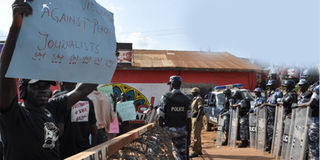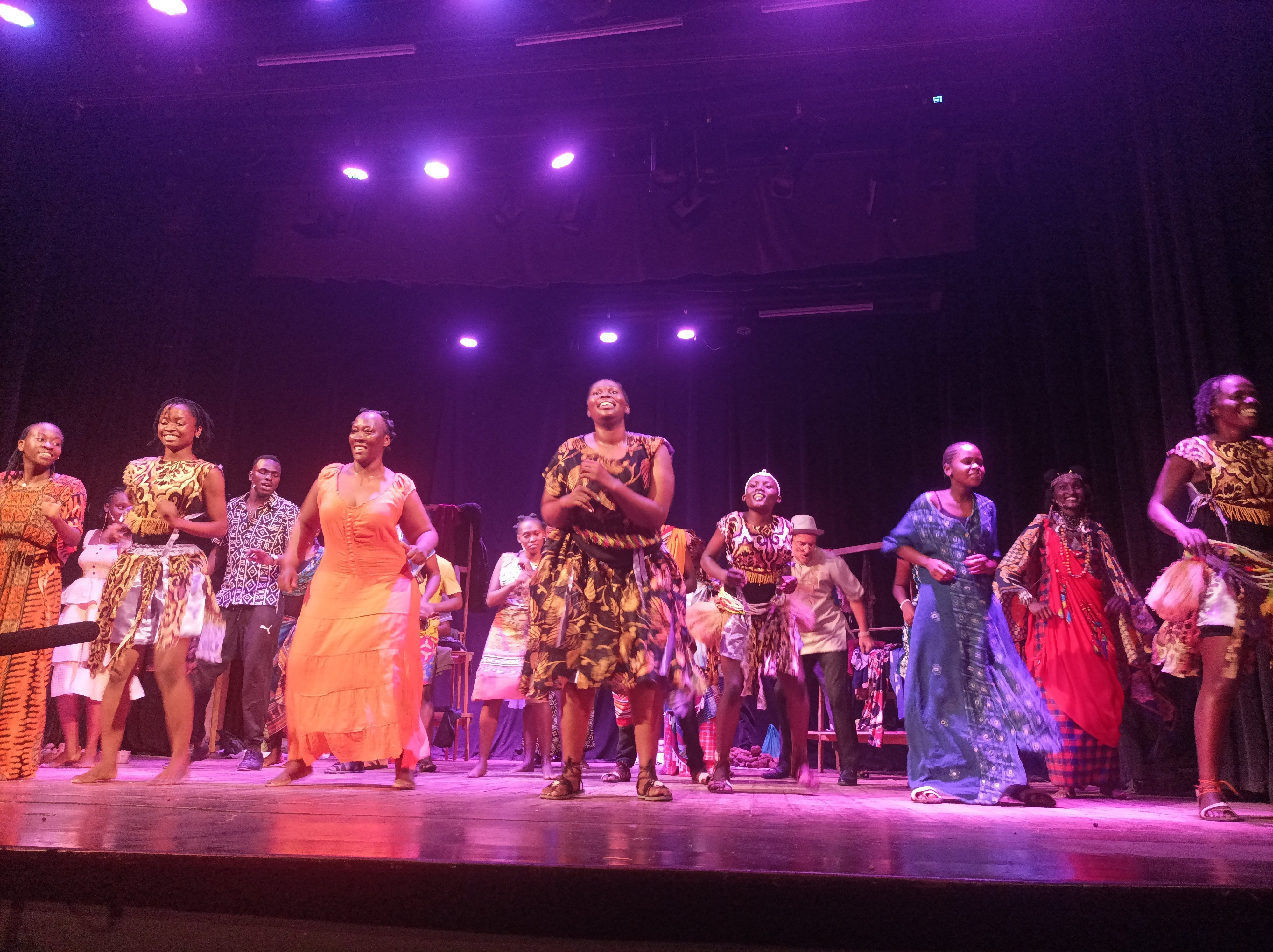Is journalism a yoke that must be carried?

What you need to know:
Tomorrow, May 3 is the 20th World Press Freedom Day running under the theme “Media Freedom for a better future; shaping the post-2015 Development Agenda”. It is also two weeks shy of a year since Monitor, its sister radio stations, Kfm and Dembe were closed together with Red Pepper. Has anything changed?
May 20, 2013 started like a normal day at Monitor Publications Limited (MPL). By 11:30am Police and plain clothed officers commanded by Geoffrey Musana stormed the media house’s premises located on 8th Street Industrial Area in Namuwongo. Five armed policemen entered the premises. Five blocked the entrance as seven seized the parking lot.
A second police patrol car pulled over and more policemen jumped off, spreading out across the building. In a matter of minutes, they had sealed off Monitor Publications.
The printer which publishes Daily Monitor, Saturday Monitor and Sunday Monitor newspapers, a sports vernacular Ennyanda, as well as radio stations KFM and Dembe FM were switched off. Concurrently, similar events were playing out at Namanve, at Red Pepper newspaper.
The security was looking for a letter authored by the former Coordinator of Intelligence Services, Gen David Sejusa popularly known as Tinyefunza, who had fled to London.
Gen Sejusa has alleged in a letter that there was a project to make Brig Muhoozi Kainerugaba, the commander of the elite Special Forces, president. The serving soldier and first son, has since denied such claims, as baseless, while Gen Sejusa is still in exile a year later.
He has also been replaced in the military and Parliament where he held a seat as a representative of UPDF. Parts of the letter had been quoted in the Daily Monitor story published on May 7 under the title Probe Assassination Claims, Says Tinyefuza.
As news spread of the media closures, human rights activists and journalists camped at the Monitor Publications offices to protest but police met them with tear gas to disperse them.
At the end of the day, Monitor and Red Pepper offices were sealed off and declared “crime scenes”. It was to remain that way for 11 days as a slow paced search for the letter was done, the different court orders issued and revoked notwithstanding.
Effects of the closure
As we celebrate World Press Freedom day today, the attack on Monitor and Red Pepper is a harsh reminder that state sponsored attacks on media space and freedoms is much with us.
There were widely-spread fears that the bold, independent journalism of Daily Monitor might have been compromised in the aftermath but, the newspaper editors emphasised their commitments to the group’s editorial policy guidelines and objectives.
Dr Peter G. Mwesige, the Executive Director of African Centre for Media Excellence (ACME) says, “Indeed, there were a couple of stories whose treatment later suggested that perhaps the closures were having their toll on the independence of these media platforms. But I think the four that were closed have recovered and are today probably as bold and critical as they were before the closure.”
Mr Robert Ssempala, National Coordinator, Human Rights Network for Journalists Uganda (HRNJ-U) however says there is still a cause for concern as upcountry media outlets have not fully recovered from that shock.
“Media houses were issued with rules guiding them on issues they can and cannot comment on. And out of fear of facing the wrath of UCC (Uganda Communications Commission) like had been the case with Daily Monitor, the managers asked journalists to carry out self-censorship,” says Ssempala.
Suppressions from the past
The closure of the four media outlets is one of the numerous attempts at suppression of press freedom by the state. The Human Rights Watch May 2010 report stated that since political campaigns in 2005, more than 30 journalists were summoned by the police or charged with crimes such as sedition, incitement to violence, and promoting sectarianism. At least 10 radio journalists and talk show panelists were charged in the same year.
The report adds, “During riots in the capital, Kampala, in September 2009, Ugandan police and soldiers beat and detained journalists who were trying to report on unfolding events or debate the cause of the riots on the radio. The government shut down four Kampala radio stations without notice or hearing.
It also arbitrarily banned open-air broadcasting, known as bimeeza, a popular forum for public debate. That ban remains in force.”
The Press Freedom Index Report 2011, titled Shrinking and Sinking by the Human Rights Network of Journalists revealed that in 2011 alone, 107 journalists were either tortured by security agencies or had their equipment confiscated or destroyed.
In May 2012, the government proposed a law to ban journalists from entering Parliament with electric gadgets for the law makers’ privacy while in the chambers.
While in 2013, Human Rights Network for Journalists-Uganda documented 124 violations against journalists and media practitioners. In the first quarter of 2014, over 25 cases of violations have been documented so far.
Inevitably, Uganda has slipped 43 places to 139th position in the latest (2012) World press freedom index by Reporters Without Borders.
Victory
In the few cases before courts, judges have upheld the right to freedom of speech.
In Obbo & Mwenda v. Attorney-General, a landmark 2004 case, Justice Joseph Mulenga deemed the crime of “publishing false news” unconstitutional and stated that, “A person’s expression or statement is not precluded from constitutional protection simply because it is thought by another or others to be false, erroneous, controversial or unpleasant. Everyone is free to express his or her views…”
Recent restricting laws
Also, the Press and Journalists (Fees) Regulations is hurdle for many journalists whose remunerations are already below market rates.
A journalist will be required to pay Shs200,000 to obtain a practicing certificate, Shs100,000 for annual renewal of registration and Shs30,000 for issuance of a certificate of enrolment, among other charges.
Minister for Information and National Guidance Rose Namayanja Nsereko during a breakfast meeting with media editors explained, “There are so many masqueraders who have invaded the profession (journalism) and they are abusing it, the fee is not to gag journalists, but to know who is who in the media. If possible, media houses are going to submit their journalists’ names to the ministry.”
Ssempala however, says, the new guidelines should be rejected, adding that they infringe on freedom of speech on which the media is premised. He added that the media fraternity drafted an alternative but government rejected it.
Dr Mwesige however says, “The real debate should not be on the new fees but on the law under which they have been imposed.”
He says what should be questioned is, “Is it an acceptable law? Is it in line with constitutional guarantees of the rights to free speech and freedom of expression? Are the restrictions it imposes reasonable and justifiable in a free and democratic society? What does licensing journalists mean for citizens who are not practising journalists but who have a constitutional right to express themselves, including writing newspaper opinions, blogs, and sharing ideas via social media?”
Who is to blame?
Dr Mwesige says, “Uganda has many passionate journalists who work hard, very often under difficult circumstances, to inform the public and hold those who hold power accountable. However, we also have a problem of journalists who don’t invest enough in ensuring that what they report is accurate, fair, significant, and complete.”
He adds that some engage in more egregious unethical behaviour and these inform the government’s moves to “bring them to order”.
“But this should not justify the government’s tendency to want to control the media instead of facilitating an independent regulatory environment that promotes the constitutional right to freedom of expression,” Mwesige added.
HRNJ-U calls upon journalists to live beyond May 3 by picking up points to act on as they go about their day to day work.
THE NUMBERS
107 The number of journalists whose rights were abused in 2011
124 The number of violations in 2012
25 The number of violations in the first quarter of 2014




